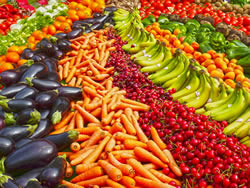Jim Erickson* says global agriculture produces enough calories to feed 9 billion people, so the focus on crop yields is not the solution to world hunger.
 Too much of the work to end global hunger focuses on increasing crop yields, researchers argue.
Too much of the work to end global hunger focuses on increasing crop yields, researchers argue.
Members of the University of Michigan’s Sustainable Food Systems Initiative reviewed recent academic papers that discuss the United Nations’ goal of ending hunger and malnutrition worldwide by 2030.
They reviewed recent papers from three areas — ecology and agricultural sciences, nutrition and public health, and political economy and policy science — that mentioned the UN zero-hunger goal.
“Zero hunger” is one of 17 Sustainable Development Goals that the UN adopted in 2015.
The stated goal is to “end hunger, achieve food security and improve nutrition, and promote sustainable agriculture” worldwide.
The two-pronged goal of tackling hunger and environmental sustainability is a tall order and will require “transformative political and economic change” that reshapes the global food system, the team concludes in the journal World Development.
Even so, many scholars choose to focus narrowly on increasing crop yields to solve world hunger while ignoring other key elements of the food system, including crop types, the environmental impacts of farming, processing, and distribution, and who has access to food.
“The success or performance of agroecosystems is typically evaluated according to exceptionally narrow efficiency criteria, particularly yield per unit area,” the authors write.
“As a result, gains in yield are realised without accounting for ecosystem degradation or the long-term capacity to sustain food production, and the focus on single crops (monocultures) ignores loss of crop diversity and thus quality of human diets.”
Globally, 815 million people are undernourished, and as many as 2 billion suffer from nutrient deficiencies, according to the UN.
At the same time, world agriculture produces enough edible calories to feed 9 billion people.
The most effective path toward the UN’s zero-hunger goal should rely on greater attention to the nutritional quality of diets, development of policies that increase equity and access to food, and an increased reliance on insights from the field of ecology, according to the authors.
Farms are complex ecosystems: ecological principles determine how they function, as well as their environmental impacts.
Yet many scholars don’t consider ecology when thinking about agricultural systems.
Applying ecological science to the world’s food systems has the potential to improve the environmental sustainability of food production in several ways, promoting biodiversity while reducing reliance on pesticides and fertilisers, according to first author Jennifer Blesh of the University of Michigan School for Environment and Sustainability.
“Increasing biodiversity on farms can build soil fertility while reducing nutrient pollution into waterways and helping to lower agriculture’s contribution to climate change,” Blesh says.
“Increasing landscape-scale biodiversity can also reduce pest pressure and the need for harmful pesticides, while helping to preserve wild species.”
“The goal is to develop cropping systems that support healthy ecosystems while providing a diverse mix of crops for human consumption.”
* James Erickson writes about science for University of Michigan News. He tweets at @JamesErickson11.
This article first appeared at www.futurity.org/.


